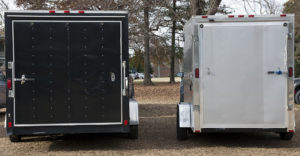HOA Parking Rules: Resolving Common HOA Parking Issues And Rules Enforcement

HOA parking rules are a common point of contention in homeowners associations. The key to resolving issues related to parking, though, lies in understanding what rules the HOA can and can't enforce.
Browse By Category
Sign up for Our Newsletter
HOA parking rules are a common point of contention in homeowners associations. The key to resolving issues related to parking, though, lies in understanding what rules the HOA can and can’t enforce.
Creating and Enforcing HOA Parking Rules
Living in an HOA community means having to abide by the many rules and restrictions that exist to keep the neighborhood in order. One of the most disputed rules in any given HOA, though, often relates to parking. Considering there are about 273.6 million registered motor vehicles in the United States, it’s easy to see why.
When enforcing homeowners association parking rules, the first thing your board must do is refer to your governing documents. Your CC&Rs should clearly dictate in black and white what your HOA parking policies are. Your policies should be direct and explicit, leaving no room for misinterpretations. Use specific language when crafting your parking rules so that homeowners know exactly what to expect.
It’s often difficult to balance HOA parking restrictions and keep homeowners happy at the same time. But, since the HOA exists to maintain the community, you must make it apparent to all members that these rules are for the good of the association.
Sample HOA Parking Rules
What are the typical parking rules a homeowners association might have? Rules can vary from community to community. However, HOAs generally enforce rules concerning what type of vehicles can’t be parked inside the community, where vehicles can be parked, how long vehicles can be parked, and certain time periods vehicles can be parked in a given spot.
1. Prohibiting Certain Vehicle Types
 Many associations have restrictions on the type of vehicles homeowners can park inside the community. Usually, HOAs don’t allow trailers, RVs, boats, campers, and vehicles with commercial signs. Associations do this to maintain the aesthetic appeal of the community and, therefore, keep property values high.
Many associations have restrictions on the type of vehicles homeowners can park inside the community. Usually, HOAs don’t allow trailers, RVs, boats, campers, and vehicles with commercial signs. Associations do this to maintain the aesthetic appeal of the community and, therefore, keep property values high.
2. Regulating the Parking Location
There are also a lot of associations that have rules about where homeowners are permitted to park. Generally, homeowners can park their vehicles in their driveway, but there may also be a designated area for this. For instance, in condo associations, unit owners may have specific spots in a common parking lot.
3. Regulating the Time Period or Length
The last of the most common types of parking rules has to do with how long homeowners can park their cars in a certain spot before getting towed. For example, if the HOA has a common parking area, the board might allow vehicles to park for a maximum of 24 hours. If the owner goes beyond that, the HOA can take action. Associations do this so that the community doesn’t accumulate abandoned vehicles.
In other cases, associations may only allow homeowners to park in a specified area within the allowed timeframes. For instance, homeowners may only park in the clubhouse parking lot between 8 a.m. to 8 p.m.
Frequently Asked Questions About HOA Parking Regulations
Can HOA Restrict Parking on Public Streets?
Can HOA enforce no parking on street? It depends on whether the street is public or private. In most cases, associations have no authority over public streets. Therefore, they can’t really say whether or not members can park there unless state laws say otherwise. If a violation occurs on a public street, law enforcement has jurisdiction. In contrast, HOAs are free to regulate parking on private streets within the community.
How do you know if a street is public or private? If the general public, i.e. non-members of the HOA, can use the street, then it’s a public street. Public streets are maintained by the government. On the other hand, private streets are maintained by the HOA and are only open for member use.
Can HOA Force You to Park in Your Garage?
It might seem unfair, but the HOA can make you park your vehicle in your garage. Associations usually do this for vehicles that don’t meet their standards or are prohibited within the community. It’s a matter of preserving aesthetics and keeping the community appealing to the eyes.
Can HOA Restrict Parking in Driveway?
Yes, some associations can restrict the type of vehicle homeowners can park in their own driveway or on the street in front of their house. HOA driveway parking rules exist to maintain the appeal of the neighborhood. Again, it all boils down to aesthetics.
Can HOA Impose Speeding Limits?
 In general, homeowners associations can impose speed limits within the community, provided that it only applies to private streets and your CC&Rs give you the power to do so. Make sure the speed limit doesn’t conflict with local ordinances, though. If it does, then you can’t enforce it.
In general, homeowners associations can impose speed limits within the community, provided that it only applies to private streets and your CC&Rs give you the power to do so. Make sure the speed limit doesn’t conflict with local ordinances, though. If it does, then you can’t enforce it.
Can HOA Limit Number of Cars?
While associations typically can’t limit the number of cars you can own, they can limit the number of cars you can park in your driveway or in common areas. Condos and apartments usually limit it to one parking slot per owner. Therefore, if you have a lot of cars, you need to (legally) find somewhere else to park them.
HOA Parking Enforcement: Making Sure Owners Comply
Just as difficult as coming up with HOA parking rules is enforcing them. Violations do happen, and they can happen with parking as well. But, can your HOA issue tickets and tow vehicles?
Temporary Revoking of Privileges
While not all HOA boards have this authority, some can temporarily revoke owner privileges after committing a violation. The process can change depending on the association, but it usually involves sending an HOA parking violation notice as well as an option to have a hearing. Given the severity of this type of punishment, though, it’s usually reserved for repeat offenders. Check your CC&Rs to verify whether you can suspend owner privileges.
Towing of Vehicles
Is the HOA allowed to tow vehicles that violate parking restrictions? Can HOA tow without warning? These are common questions homeowners ask when it comes to towing. The answer is, it depends on the laws in your state. Generally, though, associations can tow vehicles that violate parking restrictions.
Your board should first send a notice to the offending homeowner informing them of the violation at least 96 hours before towing the vehicle. Then, provide written authorization to let the towing operator know that your HOA has the power to request the tow. After that, you should inform the owner of the tow within one hour of authorization. You should also report the towing to your local traffic law enforcement agency within the same timeframe.
Although you can tow vehicles, it should be your last option. More often than not, taking this route will result in a more complicated and heated argument between the owner and your board.
Common HOA Parking Issues and How to Resolve Them
Every association encounters problems with parking. The trick is to learn how to deal with them. Here are HOA parking solutions to some of the most common parking issues that your HOA board can utilize:
- Insufficient Parking for Residents. If you don’t have enough parking for residents, you can convert some guest parking spaces to resident parking. This is provided you live in a community where the HOA owns the common areas.
- Residents Parking in Guest Spots. If this isn’t allowed in your community, you must inform all homeowners and post signs reflecting that. A good way to curb this type of prohibited behavior is to levy fines and suspend privileges. You can even resort to towing if the problem remains rampant.
- Scarce Parking for Guests. If you live in a planned community, you can charge a parking fee to guests who want to park in guest spaces. Alternatively, you can also require guests to obtain HOA parking permits. This will allow you to prevent fights from breaking out between owners. Make sure to check your governing documents, though, to see if you have this power.
- Inadequate Handicapped Parking. Certain federal laws like the Fair Housing Act and the Americans With Disabilities Act require you to accommodate disabled residents. Make sure to have proper handicapped parking available. If that’s not possible, try to rework the space to make it more accessible to disabled residents.
Final Reminders
Can HOA restrict parking? The short answer is yes. Provided the CC&Rs outline the HOA’s authority to do so, an association can impose HOA parking rules. When crafting and enforcing these rules, though, make sure they comply with federal, state, and local laws. Your governing documents should also give the HOA the authority to impose them.
RELATED ARTICLES:
- HOA Electric Car Charging Policy: Why Have One?
- Should Having Service Animals In An HOA Be Allowed?
- 6 Tips On How Can HOA Enforce Rules And Regulations
Trending Now
Related Article
Sign up for Our Monthly Newsletter
Sign up below for monthly updates on all HOA Resource














